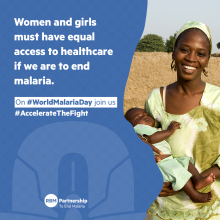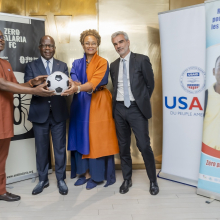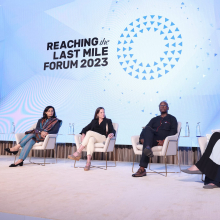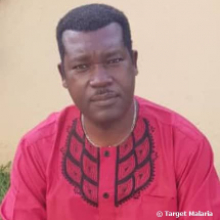This World Mosquito Day, we speak to Dr Christen Fornadel, Senior Technical Coordinator at the Innovative Vector Control Consortium (IVCC).
Hello Christen, thank you for speaking to us this World Mosquito Day! Can you start off by telling us a little about your role at IVCC?
Hi, I’m a Senior Technical Coordinator at IVCC, sitting within the Market Access Team, and I’m excited to be talking to you ahead of World Mosquito Day.
An important part of my role is ensuring vector control products are integrated into country-level control programmes and have an equitable impact amongst all countries and people that need them. Within the Market Access Team, I lead the technical aspects of the design and implementation of market interventions for new malaria vector control tools, which create demand and generate cost-effectiveness data. I also provide technical leadership and oversight in support of IVCC’s product portfolio from development to launch.
The mosquito is notoriously good at evolving to evade the latest malaria control tools – what does this mean for vector control tools like insecticide-treated nets (ITNs) and indoor residual spraying (IRS)?
We know that, over time, mosquitoes develop resistance to novel insecticides we put on ITNs or in a spray. In simple terms, this means that mosquitoes are no longer killed with the standard dose. That means we need to be proactive in managing the tools we use to slow down this process as much as possible, for example by rotating the type of IRS or ITN used in each replacement cycle or by combining tools that kill mosquitoes in different ways. Integrating other non-insecticidal means of preventing malaria where feasible - such as environmental management and housing improvement - will also help address resistance.
Can you tell us how IVCC is working to address the emergence of insecticide resistance through the New Nets Project?
The New Nets Project piloted the use of insecticide nets treated with new insecticide combinations in moderate to high transmission areas throughout sub-Saharan Africa. These nets included BASF’s Interceptor® G2, a net combining a pyrethroid as well as chlorfenapyr, which is active against pyrethroid-resistant mosquitoes, and DCT’s Royal Guard®, which combines a pyrethroid with pyriproxyfen to reduce the fertility of mosquitoes that survive exposure. The project assessed the cost-effectiveness of these nets to help countries make informed decisions about how best to spend their malaria control budgets.
In March, two new types of dual-insecticide nets were recommended for use in malaria-affected regions with insecticide resistance. How did partners contribute to this milestone, and what does this recommendation mean for countries?
The WHO recommendation for use of two new types of nets was brought about through a remarkable coordination of partner efforts.
This started with the first randomized controlled trial in Tanzania, funded by the UK’s Department of Health and Social Care and DFID (now merged with the Foreign and Commonwealth Office, FCDO), the UK Medical Research Council (MRC) and Wellcome.
A consortium of partners including London School of Hygiene and Tropical Medicine also conducted a randomized controlled trial of the new net types in Benin, to complement the Tanzania study.
PATH led the implementation of effectiveness pilots with country partners in Burkina Faso, Mozambique, Rwanda, and Nigeria, while Tulane University (based in New Orleans) led on cost-effectiveness work, and Imperial College London led on impact modelling.
The Liverpool School of Tropical Medicine (LSTM) led on laboratory entomological testing and entomological correlates of efficacy. PSI and The Alliance for Malaria Prevention led on net distribution and operational lessons learned. Unitaid and Global Fund directly supported the project.
The project received additional support from the U.S. President’s Malaria Initiative and the Bill & Melinda Gates Foundation who, through MedAccess, supported a volume guarantee that enabled BASF to reduce the price of procuring Interceptor® G2 nets.
The WHO recommendation means countries can now access these new tools to combat insecticide resistance and further reduce their malaria burden.
How is IVCC working with partners to help ensure that dual-insecticide nets can be widely accessible to people who need them?
The New Nets Project had a significant market-shaping component to catalyse the introduction of the new nets. Market shaping work under the project was able to increase both supply and demand for the new nets, laying the foundation for ensuring equitable and affordable access to these new tools.
Attractive Targeted Sugar Baits (ATSB®) are another promising new tool in the pipeline. Can you tell us more about these devices and how IVCC is working with partners to pilot them?
The basic approach of ATSB®s is to lure mosquitoes to a toxic sugar bait and kill them. Both female and male mosquitoes need plant-derived sugars to maintain energy for survival, presenting an opportunity to bait the sugar-feeding process with a toxicant.
IVCC is currently working with Westham Co., with support from the Bill & Melinda Gates Foundation, to conduct three randomized controlled trials in Mali, Zambia, and Kenya on the effectiveness of ATSB®s to reduce malaria. If successful, ATSB®s would offer a novel tool to combat malaria by targeting a different part of the mosquito life cycle from ITNs and IRS, which target blood feeding and indoor resting respectively.
From your perspective, why is it so important that the world builds its R&D capacity and encourages scientists to drive new solutions in the fight against diseases like malaria?
We need to find new solutions in the fight against malaria and other mosquito-borne diseases like dengue because of the huge toll these illnesses inflict globally. Even with the ramp-up in funding and coverage of malaria prevention and treatment since 2000, there were still an estimated 247 million cases of malaria leading to 619,000 deaths 2021.
Separately, there were 5.2 million dengue cases recorded in 2019. Malaria and dengue also inflict an economic burden on populations that are already disadvantaged, maintaining a cycle of poverty. New solutions to tackle mosquito-borne diseases are needed to break this cycle, driving economic improvement that will also further reduce disease burden, for example through improved housing.
Do you have a message you would like to share with the malaria community this World Mosquito Day?
We have come a long way in our understanding of mosquito-borne diseases since 1897 when Sir Ronald Ross discovered that Anopheles mosquitoes were responsible for the transmission of the malaria parasite, but we should use the occasion of World Mosquito Day to recommit ourselves to the elimination of the disease.
Finally, can you tell us why you dedicate your career to the study of mosquitoes and fighting malaria this World Mosquito Day?
Mosquitoes are fascinating creatures. Having been around since the time of the dinosaurs they are very adaptable, living both in tropical and arctic conditions and feeding off mammals, birds, reptiles, and amphibians. Of the over 3,500 known mosquito species, less than 10% are confirmed or likely vectors of human disease-causing pathogens like malaria. However, those species that spread the most disease have evolved closely with humans, making them very efficient vectors and the world’s most dangerous animal to humans.

Latest Blogs



